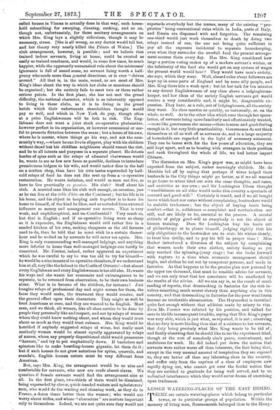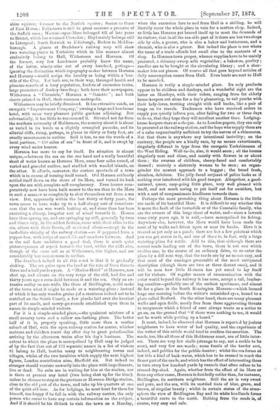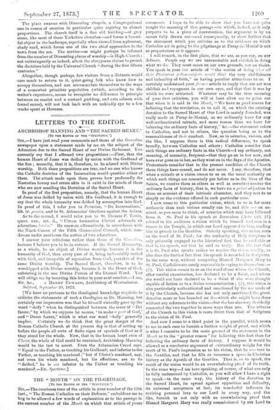LESSER WATERING-PLACES OF THE EAST RIDING.
THERE are certain watering-places which belong to particular towns, or to particular groups of population. Within the memory of living man, Bournemouth belonged thus to the Hamp-
shire squires; Cromer to the Norfolk squires ; Seaton to those of East Devon ; Felixstowe is still in great measure a preserve of the Suffolk ones ; Weston-super-Mare belonged till of late years to Bristol, which has retained Clevedon ; Rhyl mainly belongs still to Liverpool ; North Berwick to Edinburgh, Redcar to Middles- borough. A glance at Bradshaw's railway map will show two watering-places in Yorkshire which in like manner almost exclusively belong to Hull, Withernsea and Hornsea. Of the former, very few Londoners probably know the name, of the latter, ninety-nine out of every hundred, perhaps— ignoring the distinction which topography makes between Hornsea and Hornsey—would assign the locality as being within a 'bus- ride of the City. Yet both are, in their way, thronged health and pleasure-resorts of a busy population, feeders of excursion trains, large promoters of donkey-breeding ; both have their newspapers, Withernsea a " Chronicle," Hornsea a " Gazette " ; and both sheets printed in Hull, their common metropolis.
Withernsea may be briefly dismissed. It has extensive sands, an energetic "Improvement Company," owning a large and handsome hotel, with some very pleasant public gardens adjoining. But substantially, it has little to recommend it. Situated not far from the southern extremity of Holderness, the country about it is about as varied in its levels as a slightly crumpled pancake, and its alluvial cliffs, rising, perhaps, in places to thirty or forty feet, are cruelly monotonous in outline. Still it has, to use the words of a local partisan, 450 miles of sea " in front of it, and is swept by every wind under heaven.
Hornsea has more to say for itself. Its situation is almost unique,—between the sea on the one hand and a really beautiful sheet of water known as Hornsea Mere, some four miles round, of varied and graceful outline, and studded with wooded islands, on the other. It affords, moreover, the curious spectacle of a town which is in course of turning itself round. Old Hornsea evidently settled itself down on the shore of its Mere, and turned its back upon the sea with complete self-complacency. Even houses com- paratively new have been built nearer to the sea than to the Mere in such a manner as completely to shut themselves out from a sea view. But, apparently within the last thirty or forty years, the town seems to have woke up to a half-sleepy sort of conscious- ness that the sea was worth looking at, and since then has been executing a clumsy, irregular sort of wheel towards it. Houses have thus sprung up, and are springing up still, generally by twos and threes only, in the oddest fashion, some with their sides to the sea, others with their fronts, all scattered about—except in the imnIediate vicinity of the railway station—as if peppered from a pepper-box, with strips of cornfields and meadows between. And as the soil here undulates a good deal, there is much quiet picturesqueness of aspect towards the land, whilst the cliffs also, though of the same soil as at Withernsea, rise higher, and are considerably less monotonous in outline.
The drawback indeed to all this coast is that it is gradually sinking. The sea gains upon the land at the rate of from three to three and a half yards a year. A "Marine Hotel" at Hornsea, now shut up, and situate on the very verge of the cliff, had five and thirty years ago a corn-field between it and the sea. Only an ex- tensive outlay on sea-walls, like those of Bridlington, could make of the town what it might be made as a watering-place ; instead of which it has only wooden groins (of a stoutness indeed not to be matched on the South Coast), a few planks laid over the heaviest part of its sands, and merry-go-rounds established upon them to amuse its simple-minded visitors.
For it is a simple-minded place,—the quaintest mixture of a small country town and a callow sea-bathing place. The better half of it is, properly speaking, little more than a marine suburb of Hull, with the open railway station for centre, whither matrons and children resort day after day to greet paterfamilias arriving by the afternoon trains after his day's business. The extent to which the place is monopolised by Hull may be judged of by the fact that out of 133 separate: names in a list of visitors 81 belong to Hull, besides many to neighbouring towns and villages, whilst of the two localities which supply the next highest figures, London contributes nine, Sheffield six. But indeed no stranger should venture unwarily into the place with impediments, live or dead. No cabs are in waiting for him at the station, nor is there at present any hotel (two being shut up for the time), unless he chooses to stop at the previous or Hornsea-Bridge station, close to the old part of the town, and take up his quarters at one of the quiet old inns. As for lodgings, he must hunt for them for himself, too happy if he fall in with the railway carrier, the only person who seems to have any certain information on the subject. And if it should be his ill-luck to visit the town on a Monday,
when the excursion fare to and from Hull is a shilling, he will literally scour the whole place in vain for a mutton chop. Indeed, I so little has Hornsea yet braced itself up to meet the demands of its visitors, that in all the sea-side part of it there are but two shops side by side, a grocer, who is also a baker and butterman, and a chemist, who is also a grocer. But indeed the place is one where the name of a trade affords but small clue to the contents of a shop. In Hornsea town proper, whence supplies have to be mainly procured, a chimney-sweep sells vegetables ; a bakeress, poultry ; candles are to be bought at the circulating library ; and a shoe- maker lets out pianos. Of course all that goes beyond articles of daily consumption comes from Hull. Even boots are sent to Hull to be mended.
Hornsea is verily a simple-minded place. Its only products appear to be children and donkeys, and a wonderful sight are the latter on Mondays, with their riders, ranging from fat elderly house-keepers out alone for a day's pleasuring, to tall youths with their lady-loves, trotting straight with stiff backs, like a pair of tongs on its travels. Tradesmen who have received orders to supply you quietly inform you, after failing for two or three days to do so, that they hope they will recollect another time. Lodging- house-keepers stare at a cheque. As to London papers, they can only be procured at the railway station, and the boys who supply them are of a calm unpunctuality sufficient to try the nerves of a rhinoceros. Not that there is anywhere any intentional incivility ; on the contrary, the people are a kindly race, by no means extortionate, singularly different in type from the energetic Yorkshiremen of the West Riding. Well-to-do, also, it would seem ; all the houses singularly neat and clean, and mostly with flowers in or about them ; the swarms of children, cheery-faced and comfortably dressed ; scarcely a slatternly woman to be seen ; an organ- grinder the nearest approach to a beggar ; the bread fresh, alumleas, delicious. The jolly-faced serjeant of police looks as if nothing ever interfered with his good-temper. Altogether, a good- natured, queer, easy-going little place, very well pleased with itself, and not much caring to put itself out for outsiders, but with a sort of compassionate kindliness towards them.
Perhaps the most provoking thing about Hornsea is the little use made of its beautiful Mere. It is difficult to say whether this is more the fault of the townsfolk or of the Constable family, who are the owners of this large sheet of water, and—since a lawsuit some sixty years ago, it is said,—have monopolised its fishing. Anywhere else, however, the Mere would have been made the most of by walks and drives upon or near its banks. Here it is treated as yet only as a pond ; there are but a few points at which you can get access to it, and one of these is; in fact, only a largo watering-place for cattle. Add to this, that although there are several roads leading out of the town, there is not one which enables one, in the course of an ordinary drive, to re-enter the place by a different way, that the roads are by no means easy, and that most of the carriages procurable of the most antiquated description (though there are two or three decent ones), and it will be seen how little Hornsea has yet cared to lay Itself out for visitors. Of regular means of communication with the outer world beyond the railway it has none, accept a tall, lumber- ing omnibus—probably one of the earliest specimens, and almost fit for a place in the South Kensington Museum—which loomed huge one morning before the writer's astonished eyes, bound to a place called Beeford. On the other hand, there are many pleasant walks and open fields, mostly free from those aggravating threats to trespassers which a friend of ours always treats as a notice to go on, on the ground that " if there were nothing to see, it would not be worth while putting up a board."
It must, indeed, be observed that Hornsea is reported by jealous neighbours to have water of bad quality, and the experience of the writer of this article would tend to confirm the assertion. The sands, too, like all those of this Holderness coast, are of little inter- est. There are very few shells (strange to say, not a cockle to be seen), and very few sea-weeds ; some fossils of the harder sort, indeed, and pebbles for the pebble-hunter ; whilst the sea forms at low tide a kind of back-water, which has to be crossed to reach the firmer part of the sands, and which has the effect of intersecting these in turn every few hundred yards by runnels that often refuse to be crossed dry-shod. Again, whether from the effect of its Mere or from any other cause, Hornsea is decidedly colder than, for instance, Bridlington, its northern neighbour. Still the air is very sweet and pure, and the sea, with its mottled tints of blue, green, and brown, of singular beauty ; whilst in certain states of the atmo- sphere the view of Bridlington Bay and its white headlands forms a beautiful curve to the north. Bathing from the sands is, of course, very easy and safe.
The place swarms with Dissenting chapels, a Congregational one in course of erection in particular quite aspiring to church proportions. The church itself is a fine old building—of grey stone, like most of these Yorkshire churches—and forms a beauti- ful object in the landscape, especially when viewed from a pleasant, .shady road, which forms one of the two chief approaches to the town from the sea. The service—as might perhaps be inferred "from the number of Dissenting places of worship—is High-Church ; not extravagantly so indeed, albeit the clergyman claims to preach the doctrines held by the Universal Church " during the first fifteen .centuries."
Altogether, though perhaps few visitors from a distance would 'care much to return to it, quiet-going folk who know how to occupy themselves, and can accommodate themselves to the ways -of a somewhat primitive population (which, according to the writer's experience, seems to recognise no difference in principle between an omelet and a custard pudding, and eats salmon with
f ennel sauce), will not look back with an unkindly eye to a few weeks spent at Hornsea.




































 Previous page
Previous page